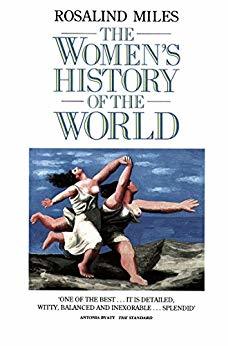
The Women's History of the Modern World
How Radicals, Rebels, and Everywomen Revolutionized the Last 200 Years
- اطلاعات
- نقد و بررسی
- دیدگاه کاربران
نقد و بررسی

November 9, 2020
Novelist and historian Miles (coauthor, Warrior Women) spotlights “rebel women” from the past two centuries in this brisk and freewheeling history. Contending that women’s liberation is “a work in progress,” Miles begins with the French Revolution, documenting how playwright and political activist Olympe de Gouges’s insistence on women’s rights and vocal critiques of male republicans led to her execution in 1793. Miles also tracks how colonialism exacerbated tensions over women’s roles, details how Southern sisters Sarah and Angelina Grimké linked abolitionism to women’s rights, and profiles 19th-century abortion provider Ann Trow, better known as Madame Restell. Other subjects include civil rights activist Rosa Parks; feminists Betty Friedan, Gloria Steinem, and Germaine Greer; and political figures Margaret Thatcher, Indira Gandhi, and Jiang Qing, wife of Mao Zedong and “supreme architect of the Cultural Revolution.” Recently, Miles contends, a “strong man” backlash against women’s gains has contributed to a resurgence of authoritarianism around the world. Miles writes with verve and jam packs her account with useful information, but her resolutely optimistic outlook for the 21st century seems at odds with the history she chronicles, and her abrupt shifts from one topic to the next can be jarring. Nevertheless, this is an energetic and enthusiastic survey of feminist boundary pushing. Photos.

November 15, 2020
English novelist and journalist Miles celebrates women's achievements--some worthy and others dubious--from the French Revolution to the age of #MeToo. Are feminists running out of neglected trailblazers to hold up for overdue praise? Readers may wonder after reading this curious narrative paean to myriad "extraordinary women" who have "banded together to remake our world." The author begins with three underappreciated heroines of the French Revolution: Olympe de Gouges, a writer guillotined for sins that included protesting injustices to women; Th�roigne de M�ricourt, a revolutionary known for "striding around town in a man's riding clothes and sporting a large hat with a flamboyant phallic plume"; and Pauline L�on, a champion of women's right to bear arms. Others who merit their entries include Patyegarang, an 18th-century Indigenous woman of Australia's Eora nation who helped to create the first written record of "the Aboriginal Language of Sydney"; and Katō Shidzue, a Japanese feminist who brought Margaret Sanger to Japan when her country classified ideas about birth control as "dangerous thoughts." Yet it's hard to fathom why, among political figures, the author taps Imelda Marcos and Jiang Qing ("Madame Mao") but not Golda Meir, or why, among aerospace pioneers, she nods to Hitler's personal pilot, Hanna Reitsch (who embraced "Nazi theories of racial purity"), but not Amelia Earhart or Russian cosmonaut Valentina Tereshkova. Miles' tone sometimes does a disservice to her subjects, as she ranges from matter-of-fact declaration to sarcastic dismissal--e.g., when she corrects herself after mentioning Vietnam's "French invaders": "sorry, colonists delivering the benefits of civilization." Still, this fact-packed chronicle may appeal to younger readers or those seeking a more playful, anecdotal approach to women's history. The book ends with "The Women's Manifesto for Equality," of perhaps less interest to American women than to their sisters in places where feminism still lacks traction. Herstory with a dash of sarcasm and a wide global and chronological reach.
COPYRIGHT(2020) Kirkus Reviews, ALL RIGHTS RESERVED.

January 1, 2021
A follow-up to her book Who Cooked the Last Supper?, this most recent work by Miles uses a familiar, lively tone to highlight the essential contributions of women that are so often overlooked by mainstream history. The author covers a mind-boggling range of time and geography, scurrying back and forth across continents in an effort to highlight as many trailblazing women as possible. The narrative does skew toward women of the Western world, but also seeks to incorporate important contributions from the Global South. Miles identifies groundbreaking feminist activists, successes of Hollywood and Wall Street, and long-overlooked soldiers and politicians. Many names will be familiar to even casual students of history, such as Harriet Tubman and Sally Hemings, but readers will also almost certainly learn about the contributions of less familiar women, such as public servant Annie Lee Moss, who was accused of communism by Joseph McCarthy. Occasional photographs throughout add context. VERDICT An interesting read for curious feminists and historians, even if the pacing and organization are sometimes uneven. Certainly, readers will learn a great deal, and the author's enthusiasm for her subject is apparent from page one through the very end.--Sarah Schroeder, Univ. of Washington Bothell
Copyright 2021 Library Journal, LLC Used with permission.

February 1, 2021
Miles tells the story of the last two centuries in the West by orienting events to women's lives, mixing in both well-known and overlooked individuals and not shying away from women with dubious legacies. She begins with women participating in the French and American Revolutions and a female soldier dressed as a man in the Civil War, and moves forward, gathering the stories of women in every sphere, from politics to art and literature, commerce, science, and sports. She tells the frustrating, even infuriating, and occasionally triumphant tales of women who were, for better or worse, radicals and rebels. These women have nudged the world toward justice and freedom despite their being confronted with disdain, persecution, and even execution. Miles sets their experiences within precisely rendered contexts and recounts them with a dash of humor, covering many aspects of life, even the most brutal, such as contemporary female genital mutilation, a disconcerting yet essential reminder of the urgent issues women still face. Miles reminds readers that women's history does not follow a straight line, and that the fight for equality is nowhere near finished.
COPYRIGHT(2021) Booklist, ALL RIGHTS RESERVED.




دیدگاه کاربران